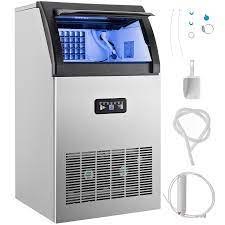
Introduction
Whether you run a restaurant, bar, hotel, or healthcare facility, having a reliable source of ice is essential for serving customers and patients. Commercial ice machines are the backbone of many businesses that require a steady supply of ice for beverages, food preservation, and medical applications. In this article, we will explore the world of commercial ice machines, their types, considerations for purchase, and the benefits they offer to various industries.
Types of Commercial Ice Machines
Commercial ice machines come in various types, each designed to suit specific business needs:
-
Ice Cube Machines: These are the most common commercial ice machines, producing classic ice cubes in various shapes and sizes. They are ideal for restaurants, bars, and convenience stores.
-
Nugget Ice Machines: Nugget or chewable ice machines produce soft, chewable ice that’s favored for its texture and ability to absorb flavors. They are commonly used in healthcare settings and for making specialty beverages.
-
Flake Ice Machines: Flake ice machines create small, soft ice flakes that are ideal for food displays, seafood storage, and medical applications.
-
Undercounter Ice Machines: These compact machines fit under countertops and are perfect for small bars, cafes, or kitchens with limited space.
-
Modular Ice Machines: Modular ice machines are larger and designed to be mounted on top of ice bins or dispensers, making them suitable for high-demand environments.
Considerations for Purchasing a Commercial Ice Machine
When choosing a commercial ice machine for your business, several factors need to be considered:
-
Production Capacity: Determine how much ice your business needs on a daily basis. Different machines have varying production capacities, so select one that can meet your peak demand.
-
Type of Ice: Consider the type of ice that best suits your business. Ice cubes are versatile, while nugget or flake ice might be preferred in specific applications.
-
Space and Installation: Measure the available space in your establishment and ensure there’s sufficient room for the ice machine, bin, or dispenser. Consider water and drainage requirements for installation.
-
Energy Efficiency: Look for an energy-efficient machine to help lower operating costs. Energy Star-rated models are a good choice.
-
Water Quality: The quality of your water supply can affect the performance and longevity of your ice machine. Consider water filtration systems to maintain ice purity and machine durability.
-
Maintenance and Service: Research the ease of maintenance and availability of service technicians for the brand and model you choose.
-
Budget: Commercial ice machines vary in price. Determine your budget and find a machine that meets your requirements without exceeding your financial limits.
Benefits of Commercial Ice Machines
Investing in a commercial ice machine offers several advantages to businesses:
-
Reliability: Commercial ice machines provide a consistent and reliable source of ice, reducing the risk of running out during peak hours.
-
Customization: You can choose the type and shape of ice that best suits your needs, whether it’s for cocktails, soft drinks, or medical applications.
-
Cost-Efficiency: Over time, having an in-house ice production system can be more cost-effective than purchasing bags of ice regularly.
-
Hygiene: Commercial ice machines are designed with sanitation in mind, reducing the risk of contamination compared to ice from unknown sources.
-
Convenience: Having an on-site ice machine eliminates the need for staff to purchase and transport ice, saving time and effort.
Conclusion
Commercial ice machines are a vital investment for businesses that rely on a steady supply of ice. Selecting the right machine that meets your production needs, fits your available space, and aligns with your budget is crucial for ensuring a seamless and efficient operation. Whether you’re in the foodservice industry, healthcare, or hospitality, a commercial ice machine can be the chilling choice that enhances your business operations and customer satisfaction.


